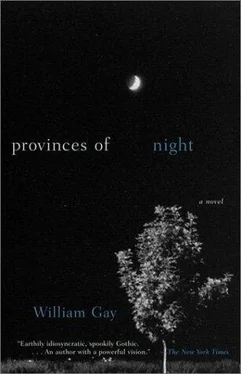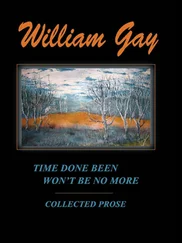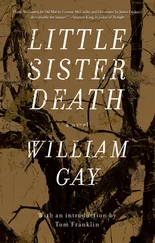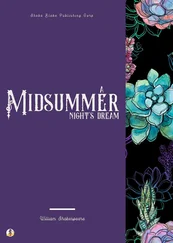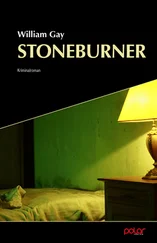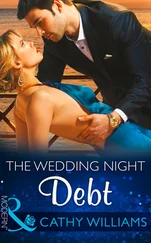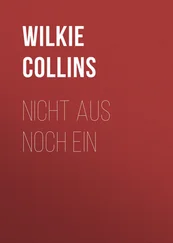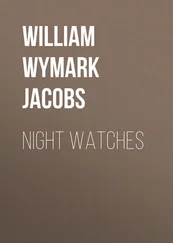I never saw anybody witch for water before. If it wasn’t too far down me and Junior Albright might dig him a shallow well.
I’d almost pay money to see a well you and Junior Albright dug, Brady said. In fact I’d see it if I had to borrow the money to get in.
He walked about the clearing, stooped and cut a forked sprout. Folks’ll tell you it has to be a peachtree sprout. Or a willow, or some such. That’s rubbish. It ain’t the stick, it’s you. If you’ve got the gift you could find it with a jack handle just as easy.
He walked about the clearing, the stick held before him by the forks. Once at the corner of the trailer it jerked spasmodically, as if a slight current of electricity had coursed through it. He walked away, began covering the area in a gridlike pattern. When he approached the same corner of the trailer the forked stick trembled again.
You mind if I try?
Brady halted and offered him the stick. This here’s the only nibble I got, he said. And it’s doubtful at best. You may do better. We may be just drownin in water a foot or two down.
Fleming held the stick in his hands as he’d seen Brady do. He crossed to the woods, back again. The fork held steady. But at the corner of the trailer it jerked in his hands, seemed almost to be vibrating. Brady was watching. He shook his head in amazement. We may have somethin here, he said. You may be on to somethin.
Fleming walked away. When he returned the stick twisted again. Brady had approached, was following along behind him. You may have the gift, he said. It shows up in ever generation of the family, I’ve run it back. You may be the one in this generation.
I may well be, the boy agreed.
He approached the deeper timber. At a clump of sweetgum the witching fork seemed taken with some kind of fit. It jerked and struggled, seemed to be trying to wrest itself from his hands. Then the point sprang earthward.
The boy tossed it aside. He stood and withdrew the water jug from the thick shaded greenery. Not too far to this, he said. Brady was watching balefully Fleming unscrewed the lid and drank. He lowered the jug. Pretty fair water too, he said.
You’re a cruelhearted little shitass, Brady told him. It’s no wonder your whole family moved off without tellin you where they were goin.

ON HIS WAY to the bus station E. F. Bloodworth was caught up in a surging tide of humanity that had turned out for some sort of festivities. He had gone only a few blocks from Cora’s boarding house when he found himself borne along whether he wanted to go or not, so dense were the folk here. Every strata of Little Rock’s society seemed represented, from sharecroppers to prosperous farmers in Panama hats. Even the jaded merchants themselves were standing in the doorways of their shops, fondling their watch chains and watching the streets expectantly as if something of enormous significance was on the verge of happening.
He finally made the shelter of an awning that shaded the front of a jewelry store, a pocket of calm backwaters eddied in the lee of swift water. He leaned on his walking stick, a handcarved length of hickory emblazoned with stars and moons and enigmatic hieroglyphs and the carved handhold carved to represent the neck and head of a serpent. The old man stood at least a head taller than anyone in the crowd milling about him and with his ferocious eyes and irritated demeanor he looked like a weary old bear beleaguered by a pack of hounds. He took out a handkerchief and wiped the perspiration off his neck and folded the handkerchief carefully and slid it into the pocket of his black suitcoat. Aside from this coat he wore a baggy pair of biglegged gray slacks and a starched white dress shirt. He wore an enormous maroon tie with the likeness of a longhorn bull adorning it. He wore the pearlgray fedora with the brim slightly rolled and cocked at a jaunty angle, and with his height and demeanor and the Stetson he would have been an imposing figure anywhere but in this sweating throng of humanity.
A short ducklike woman had been swept into the shelter of the awning. She was hanging on to three wildeyed children like survivors she’d snatched from floodwaters.
The old man had begun to hear music, the brassy strident sound of a marching band. He searched his mind for some holiday this might be that would call for a parade but could not think of one.
I was as tall as you I might be able to see something, the ducklike woman said irritably to the old man, as if she held him responsible for the disparity in their height. What do you see out there?
The tops of folk’s heads, mostly, Bloodworth said. What is this mess?
Can you not see any mules yet?
Mules? he asked in disbelief.
Yes, mules. This is Arkansas Mule Day and I’m tryin to get these kids closer so they can see better.
Why anybody would want to see a mule closer is a mystery to me, Bloodworth said.
These is all champion mules, she said dismissively, as if he’d taken leave of his senses.
A champion mule ain’t nothin but a mule with a ribbon tied on it. You walk behind as many turnin plows as I have you’d be well satisfied to never see a mule again. Or even know there’s one left in the world.
But she had no ears for such heresy and she jerked the children back into the packed wall of humanity and began to struggle toward the street.
Mules had indeed now swung into sight, a trio of them decked out in red, white and blue bunting, ridden by girls in sequined swimsuits that glittered in the sun. Behind them a phalanx of baton twirlers and a band playing a just-recognizable version of Stars and Stripes Forever and behind the band cavorting clowns on tricycles and even one riding a unicycle and waving bothhanded at the crowd. Then mules and more mules like some vast migratory herd headed westward into Oklahoma. Bloodworth ignored the mules and watched bemusedly the smooth tanned thighs of the strutting baton twirlers, his leathery face impassive and sleepy eyelids blinking occasionally like some ancient turtle basking on a rock in the sun.
When the main battery of mules had passed the crowd straggled after it as if loathe to lose this magic and after a time the old man was able to continue up the street. He had set out this day for the Trailways bus station to inquire as to ticket prices but as he reached for the door and was about to enter something caught his eye and he released the door and went on down the street. What had drawn his attention was a truck parked in an alley, not actually the truck but its license plate, a Tennessee license plate shaped like the state itself. He stood for a time studying it, leaning on the stick and lost in the geography of the shape as if it were a map, the chart of some landscape he’d crossed long ago and left his mark on.
He walked about the truck examining it intently as if it were some purchase he was contemplating making. It was a red Diamond-T truck of recent vintage and lettered in white on the doors was the legend COBLE CATTLE COMPANY, MEMPHIS TENNESSEE. The truck Was Side-boarded with a framework of black lathing, floored with straw and cow dung.
Bloodworth looked about. The nearest business was a long stucco building with a sign that said WILD BILL’S BILLIARDS. Next door was a diner. One or the other but I’d give odds on the poolhall, the old man thought and turned and limped back to the Trailways station.
Inside he drank thirstily from a drinking fountain and with the water an icy bulb swinging inside him he strode toward the counter where a young woman sat reading a paperback book.
How much is it to Ackerman’s Field, Tennessee?
The girl laid the book face up on the counter. The cover showed a nearly naked woman being shot in the abdomen by an enormous.45 caliber automatic held in a gloved and disembodied hand. The girl glanced up at the old man and unconsciously smoothed her hair and began to search through a list of cities on a schedule.
Читать дальше
